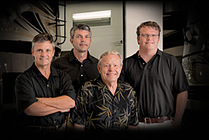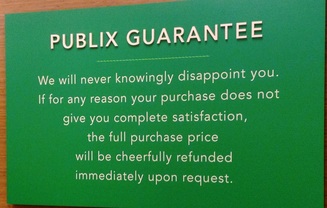 Image © by Brian E. Faulkner
Image © by Brian E. Faulkner I have found after many years consulting to businesses of all sizes (about communicating their culture and competitive advantage) that you can walk onto a sale floor, into a company headquarters or manufacturing plant and know immediately which organizations “click” and which do not. The businesses that connect have good vibes. There’s positive energy. Their leadership is genuine, sometimes even inspired. The people are real. They’re not just plodding along toward quitting time. They’re into what they’re doing -- and believe in it. The organization shares a clear purpose and vision that are not just words on some poster hung in the break room.
My son-in-law works for REI, a national retailer of recreational equipment, clothing, footwear and other attractive, well-chosen merchandise targeted to the outdoorsy crowd. He is enthusiastic about the company, which is organized as a consumer cooperative in which members get a dividend check every year for around 10% of a generous array of eligible merchandise purchased during that year, after paying a one-time $20 membership fee (you don’t have to join to shop there). The more members buy at REI, the better the deal – it’s built-in. REI also offers its members occasional deals that seem unusually attractive, in addition to store-wide sales that really are sales and not just come-ons.
The point here is that REI has both a purpose (to make the outdoor life available to more people at a good price) and values (which seem to be that people matter and the environment matters). The company uses words like approachable, collaborative, casual and playful to describe the work experience. Everybody with more than 20 hours a week gets health care. My son-in-law (who’s in retail management in an Atlanta-area REI store) says that the people who ultimately “stick” with the company buy into the REI experience (not to mention their generous performance incentives and retirement plan). They may have come in just looking for a job but end up finding a passion for work that knits comfortably into the fabric of their lives and helps assure a secure future for them and their families.
The point here is not to suggest going to work at REI, although this perennial placeholder toward the top of Fortune magazine’s Top 100 Best Companies to Work For would be a great choice. You may find something just as rewarding in some other retail setting, in a small manufacturing plant or even a big company. I have seen what, just for this article, might be called the “REI Effect” in all kinds of workplaces where business leadership and employees are in-synch and often unusually productive. They know what their purpose is, how their customers benefit, where they are going, and “what’s-in-it-for-me”, which could be just as true for a non-profit -- such as a school – as for a commercial enterprise.
So, if your goal is to find a work experience like the one exemplified by REI, try “getting a job” using a more differentiated strategy. Check the place out if it’s a retail store. Watch how the “team” works. Ask challenging questions about the merchandise and see if they rise to the occasion – even if it’s almost closing time. Ask people how they like working there. If you want to work for ABC Corporation or XYZ Manufacturing but can’t get immediate access, vigorously research them online. Talk to people who already work there; figure out where they go for lunch or to chat after work. Then request an interview with a company manager you’ve targeted (by name) before you even apply for the job. If HR gives you the stiff-arm, try calling the person directly and leave a message that inspires them to call you back. Let them know that you're interviewing them (and others). Talk to that manager about opportunities at the company, get other inside introductions and take a tour. If you want a sales position, ferret out some of the company’s customers and talk to them. This approach should pay off, whether you’re just out of school looking for your first position or a work veteran who has been “right-sized” out of a job (maybe especially so if you’re that person because you can more readily perceive what you want to see and don’t want to see).
It’s also instructive to remember that the world does not owe you a job. But you do owe yourself a good job. You are no mere commodity, and you’re not seeking commodity-like work. You have value, knowledge, experience and intelligence to add to the employer’s collective purpose -- and to their customers’ satisfaction. And you have every right to enjoy your work.
Look for that “REI Effect”, perhaps in one of the other 99 companies on Fortune’s Top 100 list. And don’t be satisfied with less. Because you’re worth it.
TakeAway: A job infused with passion and purpose pays big dividends. Use a differentiated job search strategy to find one.
Content © by Brian E. Faulkner








 RSS Feed
RSS Feed